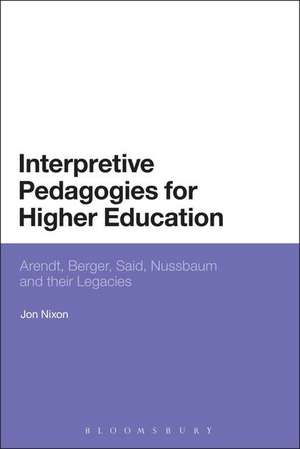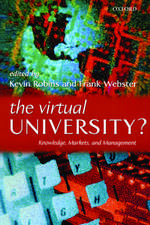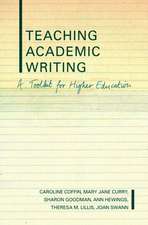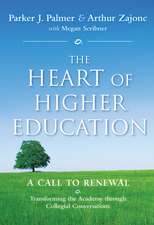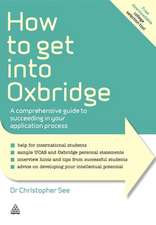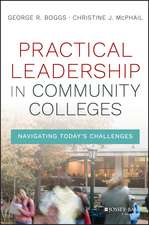Interpretive Pedagogies for Higher Education: Arendt, Berger, Said, Nussbaum and their Legacies
Autor Professor Jon Nixonen Limba Engleză Paperback – 6 noi 2013
| Toate formatele și edițiile | Preț | Express |
|---|---|---|
| Paperback (1) | 255.38 lei 6-8 săpt. | |
| Bloomsbury Publishing – 6 noi 2013 | 255.38 lei 6-8 săpt. | |
| Hardback (1) | 830.36 lei 6-8 săpt. | |
| Bloomsbury Publishing – 28 mar 2012 | 830.36 lei 6-8 săpt. |
Preț: 255.38 lei
Preț vechi: 294.30 lei
-13% Nou
Puncte Express: 383
Preț estimativ în valută:
48.87€ • 52.26$ • 40.74£
48.87€ • 52.26$ • 40.74£
Carte tipărită la comandă
Livrare economică 17 aprilie-01 mai
Preluare comenzi: 021 569.72.76
Specificații
ISBN-13: 9781472523273
ISBN-10: 147252327X
Pagini: 192
Dimensiuni: 156 x 234 x 10 mm
Greutate: 0.26 kg
Editura: Bloomsbury Publishing
Colecția Bloomsbury Academic
Locul publicării:London, United Kingdom
ISBN-10: 147252327X
Pagini: 192
Dimensiuni: 156 x 234 x 10 mm
Greutate: 0.26 kg
Editura: Bloomsbury Publishing
Colecția Bloomsbury Academic
Locul publicării:London, United Kingdom
Caracteristici
Provides signposts to new possibilities for those working in higher education whatever their institutional setting
Notă biografică
Jon Nixon holds an honorary chair at the University of Sheffield, UK, and is Senior Research Fellow in the Centre for Lifelong Learning Research and Development at the Hong Kong Institute of Education, Hong Kong.
Cuprins
PrefaceAcknowledgementsPart I: Origins1. The Place of Pedagogy2. Public Education3. The Interpretive TraditionPart II: The Legacy4. Becoming Thoughtful: Hannah Arendt (1906-1975)5.Becoming Attentive: John Berger (b.1926)6. Becoming Worldly: Edward W. Said (1935-2003)7. Becoming Responsive: Martha C. Nussbaum (b.1947)Part III: The Futures8. Open Futures9. Educated Publics10. Pedagogic SpacesReferencesIndex
Recenzii
At a time of significant financial uncertainty for universities and renewed hesitations in government and the public mind about what constitutes public and private interests, this book asks fundamental questions about the purpose and place of higher education in a globalized world. Developing interpretive enquiry within universities is a fundamental condition for creating the intellectual means of living in a "common world". This idea is developed throughout this book, and the case for this fundamental aim for higher education is made with illuminating clarity. Jon Nixon provides the opportunity of a compelling encounter with seminal texts for those seeking to problematize pedagogies and practices in higher education.
This book is elegantly written and thought-provoking. Jon Nixon has offered us a desperately needed humanistic perspective on pedagogy and its implications for academic practice and beyond. A must read for those who are genuinely concerned with the current status of higher education.
Considered and considerate: this book from Jon Nixon paints a large and innovative canvas against which to view pedagogy in higher education. In giving us insights into the work of Arendt, Berger, Said and Nussbaum, the creative possibilities of scholarship are revealed, with a new curricular framework unfolding before the reader. It is a work to which I shall want to return.
Nixon shows how the interaction between different fields of expertise provides a means for understanding the globalised world. Nixon's excellent analysis of the work of key public educators and their legacy for higher education invites the reader to think critically about higher education's social role in a democratic society in the era of cosmopolitanism and how pedagogy as a practice can contribute in this. This book is an invaluable read for anyone concerned about the future of higher education in the 21st century.
Drawing inspiration from key thinkers about education and society, he provides the reader with a roadmap which reconnects pedagogy with the public and educative purposes of the university. In so doing Jon Nixon helps to reclaim the notion of the public good in higher education.
By exploring the work of Arendt, Berger, Said and Nussbaum, Jon Nixon offers an excellent analysis on the epistemological and ethical implications of their contributions to the nature of interpretation as well as education. He provides a rich and much-needed conceptual framework for a pedagogical practice at the university, suited to the challenges of globalisation and the further development of democracy in the present and future.
This book is elegantly written and thought-provoking. Jon Nixon has offered us a desperately needed humanistic perspective on pedagogy and its implications for academic practice and beyond. A must read for those who are genuinely concerned with the current status of higher education.
Considered and considerate: this book from Jon Nixon paints a large and innovative canvas against which to view pedagogy in higher education. In giving us insights into the work of Arendt, Berger, Said and Nussbaum, the creative possibilities of scholarship are revealed, with a new curricular framework unfolding before the reader. It is a work to which I shall want to return.
Nixon shows how the interaction between different fields of expertise provides a means for understanding the globalised world. Nixon's excellent analysis of the work of key public educators and their legacy for higher education invites the reader to think critically about higher education's social role in a democratic society in the era of cosmopolitanism and how pedagogy as a practice can contribute in this. This book is an invaluable read for anyone concerned about the future of higher education in the 21st century.
Drawing inspiration from key thinkers about education and society, he provides the reader with a roadmap which reconnects pedagogy with the public and educative purposes of the university. In so doing Jon Nixon helps to reclaim the notion of the public good in higher education.
By exploring the work of Arendt, Berger, Said and Nussbaum, Jon Nixon offers an excellent analysis on the epistemological and ethical implications of their contributions to the nature of interpretation as well as education. He provides a rich and much-needed conceptual framework for a pedagogical practice at the university, suited to the challenges of globalisation and the further development of democracy in the present and future.
Descriere
Descriere de la o altă ediție sau format:
Provides a humanistic perspective on pedagogy by relating it to the interpretive practices of particular public educators: thinkers and writers whose work has had an immeasurable impact on how we understand and interpret the world and how our understandings and interpretations act on that world.
Provides a humanistic perspective on pedagogy by relating it to the interpretive practices of particular public educators: thinkers and writers whose work has had an immeasurable impact on how we understand and interpret the world and how our understandings and interpretations act on that world.
